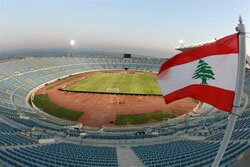
It may seem an obvious thing to say, yet it’s worth stating clearly all the same: Lebanon didn’t travel this far along the road to Brazil 2014 just to play Qatar.
At times over the past few weeks, it has felt like all of the good will built up by the national team this past year, not to mention all of the nation’s hopes and dreams, was concentrated on that single match against the Gulf side.
As the fans began to stream out of Cite Sportive on Sunday evening, you could see those dreams fading away. The popular verdict, shared by commentators and even, so it seemed, the players themselves, was clear: This was a must-win game, a golden chance to make an impression on the final round of World Cup qualifying, and Lebanon had blown it.
Hold the post-mortems. If the reward for Lebanon’s victories over the UAE, Kuwait and South Korea last year was merely a game against a dire Qatar team packed with footballing mercenaries, then those wins would hardly have been worth the price of the fans’ celebratory fireworks.
Thankfully, bigger occasions still await; Uzbekistan, Iran and South Korea are all due in Beirut over the coming months. Far from the Qatar game being the end of Lebanon’s World Cup journey, it was merely the first act of an eight-part drama that will see Lebanon come up against some of the region’s most illustrious teams.
Next up is Uzbekistan, Central Asia’s strongest side, and the dark horse in this intriguing group. Since gaining independence in 1992, Uzbekistan have never qualified for a World Cup. Yet all the same, Lebanon’s next opponents have a decent footballing pedigree, and like their hosts have enjoyed some of their best results in recent months.
Last year’s fourth-place finish at the Asian Cup was Uzbekistan’s best performance in that competition to date, though it’s their World Cup qualifying run that has really caught the eye.
Pitted in a tough group featuring Japan and North Korea as well as neighbors Tajikstan, the Uzbeks surprised many by coming out group winners, finishing unbeaten after mightily impressive 1-0 wins in North Korea and Japan.
With such good form behind them coming into the fourth round, Uzbekistan were widely tipped to challenge group favorites Iran and South Korea for automatic qualification. Yet how quickly things can change in football, and Uzbekistan arrived in Beirut in the midst of a sudden crisis.
After watching his side lose to Iran in the dying seconds of a controversial match in Tashkent last Sunday, Uzbekistan coach Vadim Abramov was promptly dismissed from his role. Though the Uzbek FA wasted little time in appointing Abramov’s successor, former national team boss Mirjalol Qosimov, the unexpected change will no doubt have had a big effect on the side’s preparations, coming as it did just 72 hours before the Friday afternoon kickoff.
All that makes it hard to say what sort of Uzbekistan team will turn up at the Cite Sportive: Abramov’s well-drilled, hard-to-beat outfit, or a team in turmoil, shorn of leadership and inspiration?
For Lebanon, the news of Abramov’s departure will have come as a welcome fillip after the disappointment of Sunday’s result. Whether the Cedars can take advantage, however, will depend on to what extent they’ve managed to put that disappointment behind them. With so much hype surrounding the Qatar game, Lebanon coach Theo Bucker’s primary concern this week will have been to remind his players that all is not lost. There is still a long way to go in this group, and time to put right the mistakes made Sunday.
If Bucker’s main challenge is to stamp out any lingering sense of self-pity among his players, then of equal concern to the German coach will be whether his side can rediscover the daring attitude that got the Cedars this far. Tactical discipline and defensive shape are all very well, yet at times Sunday you were just begging Lebanon to throw off the shackles, to start playing the sort of pacy, penetrative football that defined the third round wins over Kuwait and South Korea.
With star players Roda Antar and Mahmoud al-Ali still out injured, Lebanon will need wingers Hassan Maatouk and Ahmad Zreik to provide the attacking thrust that was sorely lacking against Qatar. In midfield, meanwhile, Bucker may be tempted to hand young starlet Nader Matar a starting berth in place of Hussein Daqiq, after the attacking midfielder impressed during his brief cameo appearance Sunday.
Despite some calls for the coach to alter his tactical approach, don’t expect Lebanon to deviate from the 4-5-1 formation that served them so well in the third round. Bucker has stated time and again that he has a clear vision for how he wants his side to play, and can point to Lebanon’s strong defensive showing against Qatar as evidence for the progress made under his stewardship.
A change in attitude, more than in tactics, then, is what is required from Lebanon against Uzbekistan. If the pressure clearly got to some of the players Sunday, then the signs coming out of the camp this week were more positive. The players were said to be in a more relaxed mood during training at the Beirut Municipality Stadium this week, clearly relieved to have finally got the fourth round under way. If that lighter atmosphere can be translated into a more positive approach this afternoon, then Lebanon will at least give themselves a chance of taking advantage of the turmoil in the Uzbekistan camp.
That positivity will also be required from the fans. Now that the novelty of getting to this late stage in qualifying has worn off, Lebanon will need a renewed effort from the supporters, as captain Youssef Mohammad made clear during his rallying cry to fans earlier in the week. With the game set to be free to enter, then the Cedars can hope to pull in the sort of 40,000 strong crowd that turned up for the matches against Kuwait and South Korea last year.
Second chances are a rarity in football. Yet though Lebanon will never get back the chance to beat a mediocre Qatar side at home, this afternoon’s game with Uzbekistan does provide the Cedars with a great opportunity to recover the sense of excitement that has surrounded the team in recent months. That, in truth, is why so many have grown to love this Lebanon side. Quite simply, they excite us. That sense of excitement was in short supply against Qatar. Today’s game offers Lebanon the chance to prove to us that it was just a blip.












